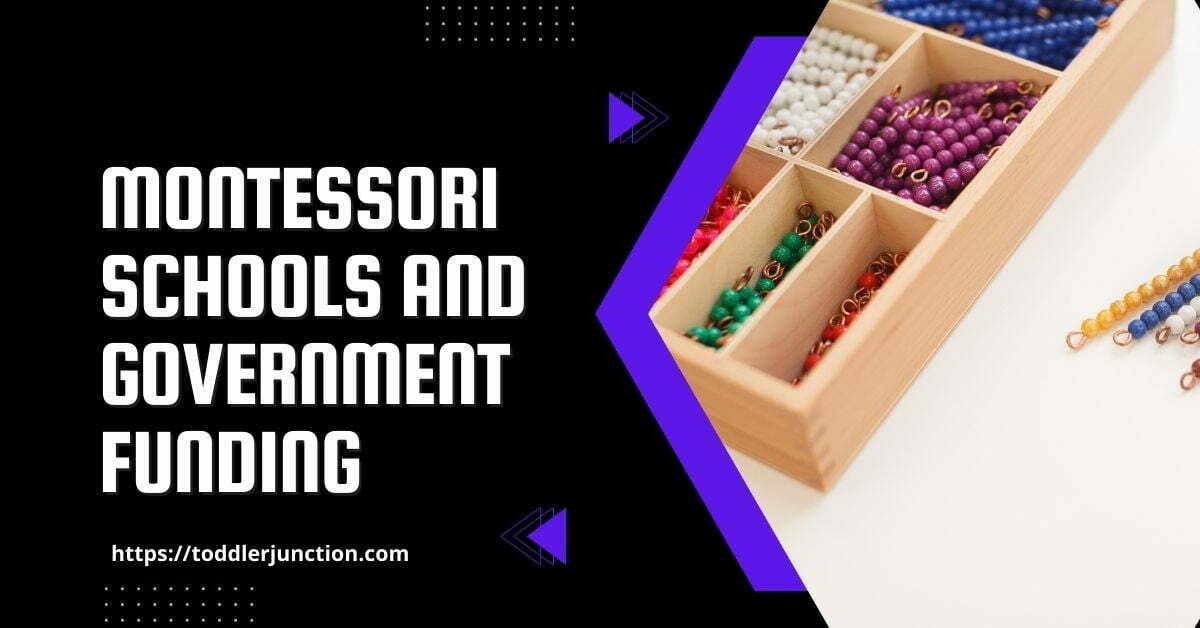Currently, many parents are split between sending their children to a Montessori school or a typical government-funded school. The Montessori approach has grown in popularity in recent years, although it has downsides.
This article will examine the pros and cons of government funding and Montessori schools to help you make the best choice for your family.
A Brief Overview of Montessori Schools
Does The government sponsor Montessori schools? Generally, they are not, as they rely on tuition and student contributions for funding.
In Montessori schools, there is an emphasis on giving a personalized and hands-on approach to learning, with an emphasis on social and emotional development.
Local governments may finance this form of education, so it is worthwhile to investigate the many alternatives available in your area.
Montessori schools are renowned for their individualized, creative approach to education. The classroom environment is specifically created to promote independence and self-directed learning, with activities and materials encouraging autonomy and curiosity.
As students study materials at their own pace, they build critical strategies for lifetime learning, such as problem-solving, motor coordination, and logical reasoning.
This distinctive learning technique used in Montessori schools enables children to develop a profound grasp of the surrounding world.
In conclusion, Montessori schools support each student’s personal growth and development by providing a distinct learning environment.
In the Montessori environment, kids, instructors, and parents develop strong ties to foster an encouraging and supportive environment.
Through this creative approach to instruction, Montessori schools seek to instill comprehensive respect for education in each student.

The advantages of a Montessori education
Montessori schools emphasize fostering an environment that encourages exploration and discovery. Individualized instruction is emphasized, allowing children to learn at their own pace and style.
Through engaging with materials and hands-on activities, Montessori classrooms offer children a unique learning environment to explore their natural curiosity and develop independence.
The objective is to instill in children a passion for learning that will endure throughout their schooling and lives.
Individualized according to the needs of each student, Montessori schools provide students with a distinctive educational experience.
This allows them to proceed at their own pace and allows each student to learn in an atmosphere adapted to his or her abilities and interests.
The mission of Montessori schools is to help students realize their full potential and provide an innovative educational experience.
Lastly, Montessori schools teach students essential life skills for success. By creating a setting that fosters independence and critical thinking, the Montessori method enables children to become self-directed and capable of developing their success strategies.
This novel educational approach is gaining popularity among parents and educators to equip young people with the skills necessary for future success.

Montessori Education Disadvantages
Montessori schools can offer a distinctive, individualized method of teaching that prioritizes student autonomy and active learning.
However, the expense of this specialized approach to education includes highly educated teaching staff and the usage of specific materials in Montessori classrooms.
While the expense of Montessori schools may be excessive for some families, those who have experienced their benefits say it is money well spent.
Montessori schools are renowned for allowing pupils to explore and acquire knowledge on their terms. However, one disadvantage of this form of school is that it can be difficult to track student development without standardized testing.
While Montessori schools encourage children to follow their interests and promote a love of learning, parents may be concerned about their child’s progress without traditional educational measures.
Therefore, parents considering Montessori schools for their children must conduct research and plan in advance to enable a smooth transition from the Montessori environment to a traditional school, if necessary.
Depending on how long they have participated in this learning experience, the transition can be challenging if the preparations are not made beforehand.

The Need for Government Funding in Montessori Schools
Unfortunately, this often necessitates government funding for them to offer inexpensive tuition. Montessori schools provide children with a quality, individualized education that is both affordable and accessible.
Montessori schools believe that all students should have the same educational opportunities and access, regardless of socioeconomic status.
Therefore, they primarily rely on government funding to ensure that schools can provide quality Montessori education at an affordable price.
Does The government sponsor Montessori schools? Although there are exceptions, most Montessori schools rely primarily on private funding.
Without government assistance, many Montessori schools would struggle to remain open and accessible to all families, making it difficult for many parents to take advantage of the potential advantages of Montessori education.
Those groups that receive government funding can frequently expand their influence beyond what would be conceivable if they relied solely on private sources.
Investing in Montessori schools through government funding would be helpful in many ways. It would allow schools to hire more experts and educated personnel, resulting in better student outcomes.
Also, the quality of Montessori schools can be significantly improved with help from the government and financial support.

Challenges of Allocating Government Funding to Montessori Schools
Montessori schools are a distinctive educational model that fosters student-led exploration and discovery. This style of education frequently requires specialized materials and activities, making it more costly than other forms of instruction.
Does the government sponsor Montessori schools? Most Montessori schools rely on tuition fees to pay for the unique learning materials and activities required for their students.
Montessori schools are gaining popularity, but a lack of certified teachers can make it difficult for schools to obtain qualified staff.
There is now a demand for Montessori educators who possess the specialized knowledge and skills necessary to teach using the Montessori method.
Although there is no single route to becoming a Montessori teacher, those interested in entering the field may consider pursuing more education and/or certification options.
In conclusion, government funding of Montessori schools can provide equal access to quality education. We can close the educational gap between different groups by funding Montessori schools and providing more students with access to superior education.


